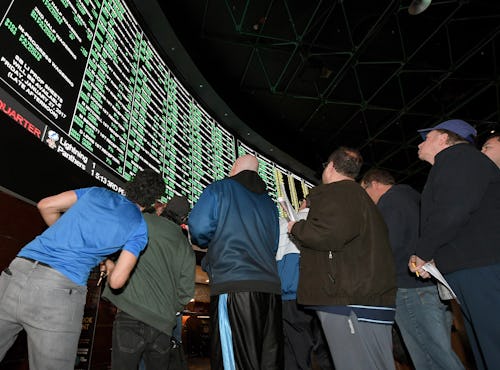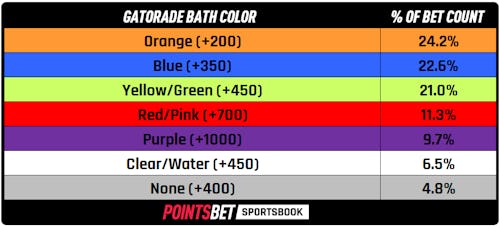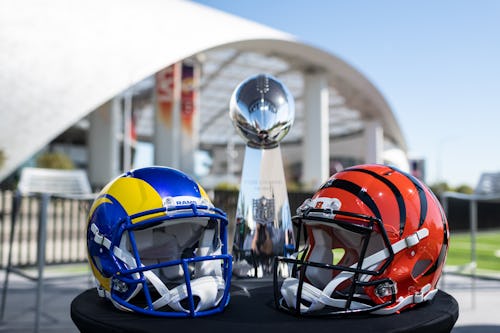
A year ago, in the frenzied hours leading up to Super Bowl LV, sports betting sites started to crash, one by one.
DraftKings, FanDuel, BetMGM, Barstool Sportsbook, and others slowed to a crawl and spit out error messages as livid users lambasted the companies on social media. The meltdown came at the most inopportune moment imaginable, on the cusp of sportsbooks’ most critical day of the year. For gambling sites this was, well, the Super Bowl. However, it felt a lot like Fyre Fest.
Several of the sites with tech issues were connected to one company, Kambi, a software developer that writes the code that runs the websites for forward-facing brands like Redbet and Rush Street Interactive, among other online platforms.
DraftKings, which used Kambi at the time, issued a statement saying “the outage was caused by a surge in traffic that caused problems for our backend provider.” Kambi had a slightly different perspective, saying the crash was a result of “significantly high volume being concentrated on one specific player-related bet offer and its increased range of outcomes offered, which were doubled in size especially for the Super Bowl.” The fact that a single game, even a single player, received so much attention that it toppled a huge site is a testament to the enormous power of the Super Bowl.
This year will bring another deluge of new traffic, as New York State opened legal betting on January 8, surpassing all expectations in its first 30 days. New Yorkers wagered over $1.6 billion in January, setting a record for the largest “handle” — or total value of bets placed — in a month in one state.
In short, New York became sports betting’s largest market pretty much overnight, with New Jersey’s $1.3 billion handle trailing behind. (Las Vegas has long been mecca for U.S. sports bettors, but with the online market wide open, states are now in contention to stake their claim to be the industry’s leader.) Experts forecast more than $7 billion in legal wagers on the Super Bowl alone, placed by a record 31.5 million Americans (which would be up 35 percent from last year).

Among the people monitoring the scene closely last year was Jay Croucher, who works for PointsBet, one of the fastest-growing sports betting platforms in the world, and one of the few sites that didn’t have any issues during the 2021 Super Bowl. Croucher, a native Australian, is PointsBet’s head oddsmaker. He’s a guy who — at 29 years old — makes predictions that affect the fates of hundreds of thousands of people.
Pointsbet, which had upward of 355,000 active users and processed $3.78 billion in wagers over the course of their most recent fiscal year, is a publicly traded company in Australia and has offices in Melbourne, plus Denver, Colo.; Jersey City, NJ; and Dublin, Ireland. Croucher says staying online amid last year’s massive traffic influx is a “point of pride” for his development team.
PointsBet touts its in-house software as one of the keys to avoiding crashes. Whereas many sportsbooks are front-end sites that rely on a third-party service to drive the back end of their websites, PointsBet handles everything itself. “If there’s something wrong, we don’t have to call another company,” Croucher says.
It’s worth noting that some of the largest betting companies have also moved to shoulder more tech load in-house recently. For example, DraftKings purchased SBTech, a back-end engine to drive the site, and is in the process of bringing the outsourced tech under its own roof. However, that deal raised eyebrows over at the Securities and Exchange Commision, which apparently is still investigating the situation.
This year, Croucher will be on the ground at the Super Bowl, watching the Los Angeles Rams play the Cincinnati Bengals at SoFi Stadium in Inglewood, Calif., while maintaining communication with the trading team to ensure everything runs smoothly. Typically, he spends the day of the big game in PointsBet’s Denver Lower Downtown offices, on the ninth floor of a brown-brick highrise.
“When you sit at your desk, you kind of feel like Keanu Reeves plugging into the Matrix.”
There’s a gorgeous view of the Rocky Mountains from the elegant, glass-walled conference room, but Croucher’s team has a n unglamorous name for the space. “We call the trading room the trenches,” he says, “because you’re going into battle against the bettors.”
On any given Super Bowl Sunday, a squad assembles at the Denver offices by 4:30 a.m. Mountain Time. The team consists of about 15 traders, people who list “markets” for users to bet on. A market is any specific kind of bet related to an event — the total points scored in a game or the number of passing yards a quarterback will have, for example.
In the trenches, “most traders have a minimum of six computer monitors and a laptop or two in addition to that,” Croucher explains. “When you sit at your desk, you kind of feel like Keanu Reeves plugging into the Matrix.”
He admits that it’s an overwhelming number of screens, but each trader has a configuration they like to best process all of the information needed to monitor the event. Among the things they’re looking at: PointsBet’s trading platform, a bet monitor that scrolls all wagers coming through, a market manager tool that tracks changing prices on lines, the websites of their competitors, and the Twitter feed of NFL insider Adam Schefter.
Traders also pull up stats pages for specific players as they’re working to determine odds and set lines for prop bets — wagers that don’t depend on the outcome of the game. For example, a trader wanting to set the odds on how many total yards Rams wide receiver Cooper Kupp will gain at this year’s Super Bowl will take a close look at his performance throughout the year to help calculate the right probability.
The abundance of hyper-specific prop bets is one of the Super Bowl’s most unique elements. Markets range from major occurrences, such as how many touchdowns a player will score, to minor moments, like who will win the coin toss. You can even bet on the color of the Gatorade dumped on the winning coach.

“Most NFL Sundays, it’s really the 90 minutes before the 1 p.m. Eastern Time kickoff where it’s really busy,” says Croucher, “but with the Super Bowl, it’s all day.” Only the opening days of NCAA basketball’s March Madness tournament come close to the intensity of Super Bowl Sunday, which reigns supreme by a wide margin.
Even amid the thrill of a live sporting event, Croucher says the room doesn’t have the frenetic energy of, say, a Wall Street trading floor. “Most of our guys are not old-school Vegas bookies,” he explains. “They’re math guys who have degrees in computational analytics or financial modeling.”
If some pressing decision arises, the room is surveyed, and the team tries to make impartial, calculated decisions. Croucher counsels his team to be even-keeled and avoid what traders call “death riding” — getting so wrapped up in an outcome that you feel like your life depends on it. Thanks to careful analytics and “vig,” or vigorish — a baked-in percentage that sportsbooks take out of every wager made — PointsBet should come out on top over time, even if it suffers some heavy losses along the way.
“You do get drawn into it, because we all like sports, we’re all fans,” Croucher says, “but at the same time, there’s the acknowledgement that we’re going to win in the long term.”
Maximum up-time
Despite the novelty of prop bets, the most popular wagers on the Super Bowl are the same as any other NFL game: the moneyline, the spread, and the over/under on the total points scored in the game.
Sports betting is a world laden with jargon, but those three markets are fairly straightforward. The most simple — the moneyline — just has bettors choose the winner, but that kind of wager pays out less. “If they’re taking the favorite at the money line, they’ll combine that with other bets in a parlay, so they’re getting bigger odds,” Croucher explains. Generally, people prefer to bet on the team favored to win. (Croucher was surprised that early bets favored the Bengals, who are this year’s underdogs.)
For this Sunday’s game, PointsBet plans to offer more than 1,000 different types of bets to users, and it already has some major action on the books. One bettor has laid down $250,000 on the Rams to win the game, which will return a total of $375,000 if the bet is successful.
Traders have to act quickly, because “micro-markets” are drastically affected by an unforeseen injury.
Even after kickoff, markets remain open with a vast array of “in-play” offerings — elements users can wager on as the game takes place. Traders take somewhat of a backseat, since most of those markets run on an algorithmic model that takes into account variables like the current score, field position, and past stats to continually update the pricing.
If a team scores, the line for the game and the spread will adjust automatically for any new incoming action. Traders just have to stay aware and make sure the model doesn’t need any adjustments, especially if something unpredictable happens.
For example, if Rams quarterback Matthew Stafford gets hammered on a play and leaves the game in the first quarter, the traders will need to make a call in real time. “There’s not a model that can tell you the likelihood of Matthew Stafford coming out of the [medical] tent, and what time he’s going to get back into the game, if he gets back in at all,” Croucher says.
Traders have to act quickly, because “micro-markets” — like the outcome of the next drive, the points scored in the next quarter, or the quarterback’s passing yards — are drastically affected by an unforeseen injury.
After making changes, traders will still rely on the algorithmic model they’ve built, but in this scenario, they’d change the original input odds to act as if Stafford was never in the game. The in-play model continues to run and uses the updated pre-match odds for any new bets moving forward. “This is all newer stuff,” Croucher says. “Two to three years ago, you weren’t seeing in-play player props. It was all pre-match, but now it’s becoming much more in-play.”
Croucher is convinced that keeping markets open for the entire duration of a game is the way to go. Even if just 15 seconds remain in an undecided game, and there’s a timeout, Croucher wants to be offering users an opportunity to bet during that window. The only catch is that the application needs to be able to shut down betting immediately and at the exact right moment.
A lag might allow wagers to flow in even after a team has won or lost the game on a last-second field goal attempt. But PointsBet wants to ride that line as closely as possible. “The most important thing is maximum up-time — having your markets always available to bet on,” Croucher says.
Massive traffic
As he watched competitor’s sites crash last year, Croucher wasn’t overly shocked. The influx of traffic was just the latest wave in a rising tide of sports betting, and mishaps have been inevitable as the industry has grown.
The popularity of online sportsbooks has gone stratospheric in recent years, beginning in May 2018, when the Supreme Court overturned a 1992 federal law that made sports betting illegal in most states. With online sports betting now legal in 19 states, the market has grown from non-existent to bringing in an estimated $35 billion annually. According to Bloomberg, bets on mobile apps constituted a minuscule portion of action shortly after legalization, but that number had grown to 84 percent in October of last year.
Matt Garrigan is the vice president of strategy for a new sports betting platform called Prophet Exchange, which plans to build a peer-to-peer betting platform where users can set their own odds and take bets directly with other users. An industry veteran, he found himself shocked at the sheer volume of New York’s first month.
“The percentage of the adult population that registered and placed a wager in the first week or month has been crazy to see,” he says. “Most knew it was going to be big, but not at this rate.” The firm GeoComply reports that New York users created 1.2 million accounts in the first 10 days of legalized online gambling there, and that nearly 90 percent of those users are new to regulated sports betting.
Despite all the new traffic, Garrigan says he isn’t concerned about another massive crash across sites this year. He was working at FanDuel last year, when the site experienced outages before and during the Super Bowl. “Those are things that were discussed hours after it happened: ‘How do we make sure this doesn’t happen again?’” he says. From his perspective, any setback presents a learning opportunity, and he believes companies will be better equipped to weather Super Bowl traffic than ever before.

Even if there are some hiccups, major traffic is good news any way you look at it. For sports betting sites, the Super Bowl isn’t just about revenue. “It’s also a massive focus for sportsbooks on [customer] acquisition,” says Garrigan. With increased visibility on the singular event, casual fans who’ve never placed a bet before are more likely than ever to try it out.
PointsBet is one of the nine companies approved to operate in New York, and Croucher says it’s feeling confident heading into this year’s big game. “Our tech team really pride themselves on getting our systems performing and able to withstand these really huge days,” he says, adding that heavy betting days throughout the year have tested its system’s capabilities.
Croucher has come a long way since 2017, when he first joined PointsBet. “It was me and the founder of the company in a dark, small office in Melbourne, manually changing the margin and points line,” he recalls. Even though he’ll probably have more fun this year, as he watches the Super Bowl IRL, he’s still laser-focused on one thing: making sure he analyzes all the data to set the most accurate odds.
Croucher is no death rider. He says individual wins and losses don’t matter so much as being right more often than not. In short, he trusts his process.
“If we lose a lot of money, so be it,” Croucher says of this Sunday’s big game. “We live with the consequences. We live to fight another day.”







